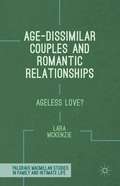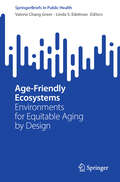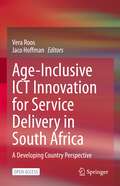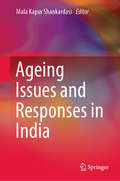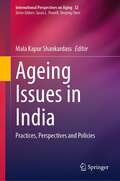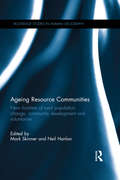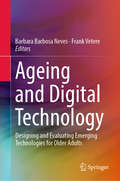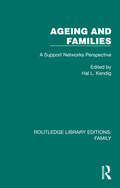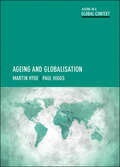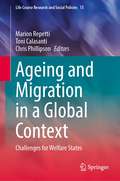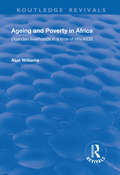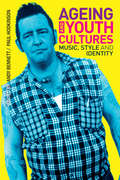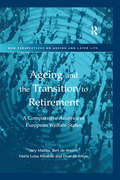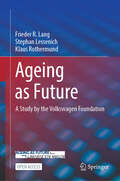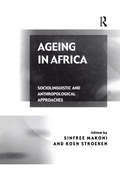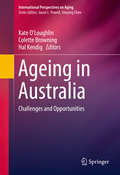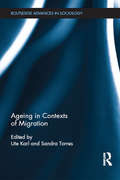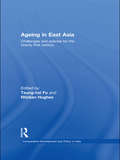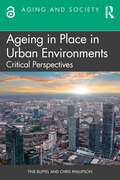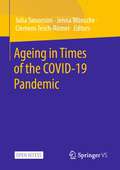- Table View
- List View
Age-Dissimilar Couples and Romantic Relationships
by Lara MckenzieIn recent years, there has been a widespread fascination with age-dissimilar, heterosexual romantic relationships. This interest is not new - these types of couples have been featured in Western media for decades, even centuries - yet qualitative research into such relationships has been limited. This book examines how the romantic relationships of age-dissimilar couples are understood. Based on a range of interviews, McKenzie argues that historical shifts toward greater personal autonomy in partner selection, within relationships, and in marriage and relationship dissolution have been greatly overstated. Through her focus on age-dissimilar couples, whose increasing prevalence have often been seen to be part of this shift, she suggests that these relationships are an avenue throughwhich shared cultural understandings of relatedness, as well as individualism, might be further analysed. McKenzie argues for an approach that emphasises cultural continuity, and which accounts for complexity and contradiction in how age-dissimilar relationships and romantic love are understood. Examining key issues of kinship, ageing and emotion, Age-Dissimilar Couples and Romantic Relationships will appeal to scholars of Cultural and Social Anthropology, Family Studies and Sociology.
Age-Friendly Ecosystems: Environments for Equitable Aging by Design (SpringerBriefs in Public Health)
by Valerie Chang Greer Linda S. EdelmanThis compact book examines age friendliness within the framework of age-friendly ecosystems, and from a place-based approach, considering anchor institutions of neighborhoods, campuses and health environments as sites uniquely positioned to catalyze age equity and inclusivity. Age friendliness has grown from an idea into a social movement that recognizes the diversity of older adults, and integrates research, policy, programming and design practices. Compounding pressures of rapid aging, systemic ageism, and a growing disparity of resources compel us to rethink how we achieve equity in aging through the design of places and practices. Content for this book draws from a 2022 symposium, Age Friendly Communities as Platforms for Equity, Health & Wellness. Contributors build upon the content shared through the symposium in order to examine how neighborhoods, campuses and health environments are uniquely poised to support equity and to extend reach to historically marginalized populations of older adults. Ideas and experiences from national experts in aging, as well as "real world" experiences and narratives shared by older adults, students, community stakeholders and faculty researchers, are presented through a place-based approach. Collectively the voices in this book create a lens for empowering age-friendly ecosystems as environments for equitable aging by design. Among the topics covered: Creating an Age-Friendly Environment Across the Ecosystem Age Friendliness as a Framework for Equity in Aging Age-Friendly Voices in the Pursuit of an Age-Friendly Ecosystem Age-Friendly Futures: Equity by Design Age-Friendly Ecosystems: Environments for Equitable Aging by Design is written for people who are interested in understanding how the age-friendly movement is transforming places we live – community planners, designers, policy makers, aging service providers, academics and citizen activists. This compact volume presents a case of need for age friendliness in places we live, learn and care for our health. Readers with interests in the professional practice areas of aging studies/gerontology, architecture and planning, colleges and universities, community/neighborhood development, health systems, research, and policy will benefit from this brief that examines neighborhoods, campuses, and health environments from interdisciplinary perspectives.
Age-Inclusive ICT Innovation for Service Delivery in South Africa: A Developing Country Perspective
by Vera Roos Jaco HoffmanThis book presents the select peer-reviewed proceedings of the International Conference on Futuristic Advancements in Materials, Manufacturing and Thermal Sciences (ICFAMMT 2022). It provides an overview of the latest research in the areas of fundamentals of material science and metallurgy, material processing, mechanical properties and material characterizations, composite materials, nanomaterials, applications of materials, advanced engineering materials, technologies for space, nuclear and aerospace applications, optimization of materials for required properties, resent trends in materials science and metallurgy. The book will be useful for researchers and professionals working in the field of material science and metallurgy.
AgeTech for Staying Connected (Synthesis Lectures on Technology and Health)
by David Clayton Arlene AstellThis book is a brief introductory guide to the role AgeTech plays in staying connected in later life. It offers insight into current AgeTech research on staying connected and illustrates entry points for deploying such technologies through a range of personas and scenarios capturing the common circumstances that lead older people to become disconnected, lonely, and isolated. The book provides readers with an accessible resource for understanding what sorts of AgeTech are available, what developments have been made and are currently underway, and what evidence exists for current technologies. The rapid pace of development in AgeTech, particularly in the commercial sphere, along with the competing claims being made for the benefits of many items, makes this practical guidebook essential for researchers and developers, policymakers, service providers and caregivers, and older adults themselves. While not intended to be exhaustive, this book covers basic information on common obstacles and barriers to technology development and adoption, things to keep in mind when using technology, and making the most of what is available to support older adults in staying connected.
Ageing Equitably with Care: Power, Policy, Practice (Ageing in a Global Context)
by Tamara Daly and Susan BraedleyAvailable open access digitally under CC-BY-NC-ND licence. What are the consequences of growing old and needing care in a world shaped by inequality? Who provides the care? What are the challenges? This groundbreaking book delves into conditions for ageing and caring, asking how they could be improved for different communities living in high-income welfare states. Emphasising that equitable ageing depends on equitable care conditions, the contributors draw on extensive empirical research. Packed with actionable policy and practice insights, this compelling volume charts a path toward a more just and inclusive future for ageing populations alongside all those providing care, whether as family members, friends or as paid workers.
Ageing Issues and Responses in India
by Mala Kapur ShankardassThis book discusses emerging issues concerning ageing in India, describes the multi-layered vulnerabilities of older adults in the context of health care and caregiving, and explores social, legal and economic perspectives. It also analyses the existing policies and programmes intended to address these age-related issues and assesses the importance of preventive geriatrics towards active ageing, as well as the current scenario of institutional care for the elderly in India. Gathering fifteen chapters written by leading researchers in the fields of geriatrics, social work, anthropology, sociology, psychiatry, economics, law and mental health, the book presents the latest findings on ageing-related topics such as elderly health, family change, old age homes, age friendly environments and the role of integrative medicine. Accordingly, it offers a valuable resource for researchers, academics, practitioners and policymakers in the areas of gerontology, demography and sociology, as well as all those interested in the study of ageing populations.
Ageing Issues in India: Practices, Perspectives and Policies (International Perspectives on Aging #32)
by Mala Kapur ShankardassThis book explores various practices and policies related to ageing issues in India. It addresses ageing concerns from a theoretical and empirical viewpoint with in-depth analyses of existential dimensions of ageing. It provides deep insights into ageing in India by discussing demographics related to health and social differentials, gender concerns, retirement problems, epidemiological transition taking place in the country with rising problem of dementia and mental health problems. It consists of 23 chapters written by various established as well as upcoming scholars in the field. The authors cover a broad range of topics with regard to provisions for institutional care, geriatric practice and emerging issues of elder abuse. The book will appeal to professionals and to lay people getting interested in ageing India from a social, health, gender, economic, psychological and emotional aspects.
Ageing Matters: European Policy Lessons from the East (Social Policy In Modern Asia Ser.)
by John DolingThe implications of population ageing have long concerned politicians, policy makers and governmental and non-governmental organizations in the welfare states of Europe. However, an ageing workforce is increasingly a matter of concern for the developed and fast-developing countries of Asia. Japan leads the field in this respect on account of the speed of its postwar economic development. But the little tigers of Hong Kong, Singapore, South Korea and Taiwan are poised to catch up, and Malaysia, though in the second tier of developing Asian economics, faces the prospect of population ageing sufficient to daunt an as yet under-prepared infrastructure for old age support. This book is the first to examine in detail the experiences and prospects of population ageing in those Asian countries with the highest GDP per capita. The authors pose the question to what extent Asia and 'old Europe' can learn from each other in terms of policy planning. The first section of the book sets out the field in terms of the demographic characteristics and policy predicaments of European and Asian countries. The second section presents case-studies of six countries: Japan, Hong Kong, Singapore, South Korea, Taiwan and Malaysia.
Ageing Resource Communities: New frontiers of rural population change, community development and voluntarism (Routledge Studies in Human Geography)
by Mark Skinner Neil HanlonThroughout the world’s hinterland regions, people are growing old in resource-dependent communities that were neither originally designed nor presently equipped to support an ageing population. This book provides cutting edge theoretical and empirical insights into the new phenomenon resource frontier ageing, to understand the diverse experiences of and responses to rural population ageing in the early 21st century. The book explores the resource hinterland as a new frontier of rural ageing and examines three central themes of rural population change, community development and voluntarism that characterize ageing resource communities. By investigating the links among these three themes, the book provides the conceptual and empirical foundations for the future agenda of rural ageing research. This timely contribution contains 15 original chapters by leading international experts from Australia, New Zealand, USA, Canada, UK, Ireland and Norway.
Ageing and Digital Technology: Designing and Evaluating Emerging Technologies for Older Adults
by Barbara Barbosa Neves Frank VetereThis book brings together Sociologists, Computer Scientists, Applied Scientists and Engineers to explore the design, implementation and evaluation of emerging technologies for older people. It offers an innovative and comprehensive overview, not only of the rapidly developing suite of current digital technologies and platforms, but also of perennial theoretical, methodological and ethical issues. As such, it offers support for researchers and professionals who are seeking to understand and/or promote technology use among older adults. The contributions presented here offer theoretical and methodological frameworks for understanding age-based digital inequalities, participation, digital design and socio-gerontechnology. They include ethical and practical reflections on the design and evaluation of emerging technologies for older people, as well as guidelines for ethical, participatory, professional and cross-disciplinary research and practice. In addition, they feature state-of-the-art, international empirical research on communication technologies, games, assistive technology and social media. As the first truly multidisciplinary book on technology use among ageing demographics, and intended for students, researchers, applied researchers, practitioners and professionals in a variety of fields, it will provide these readers with insights, guidelines and paradigms for practice that transcend specific technologies, and lay the groundwork for future research and new directions in innovation.
Ageing and Families: A Support Networks Perspective (Routledge Library Editions: Family)
by Hal L. KendigOriginally published in 1986, this title was a landmark study of ageing in Australia and a major contribution to the study of gerontology at the time. It highlights major themes on ageing in ‘western’ industrialised societies, as well as pinpointing new, emerging themes. For instance, the initial speculations in the 1960s that informal groups such as the family, neighbours, and friends play crucial helping roles for older people. The book also presents data and summarises past studies that show the common characteristics of those delivering and receiving services, such as the special role of women; and within that gender related services, the special importance of children and spouses, the importance of close proximity when people are chronically disabled, the fact that most retired people manage their own lives without help and in fact provide services to their children, and much more, is dealt with. It also looks at how such informal support works alongside the formal agencies, such as nursing homes. The systematic study of how informal and formal systems link together was one of the gaps in gerontological research at the time.
Ageing and Globalisation (Ageing in a Global Context)
by Martin Hyde Paul HiggsPopulation ageing and globalisation represent two of the most radical social transformations that have occurred. This book provides, for the first time, an accessible overview of how they interact. Ageing has been conventionally framed within the boundaries of nation states, yet demographic changes, transmigration, financial globalization and the global media have rendered this perspective problematic. This much-needed book is the first to apply theories of globalisation to gerontology, including Appadurai’s theory, allowing readers to understand the implications of growing older in a global age. This comprehensive introduction to globalisation for gerontologists is part of the Ageing in a Global Context series, published in association with the British Society of Gerontology. It will be of particular interest to advanced undergraduate and postgraduate students and academics in this area.
Ageing and Migration in a Global Context: Challenges for Welfare States (Life Course Research and Social Policies #13)
by Chris Phillipson Marion Repetti Toni CalasantiThis book brings together two major trends influencing economic and social life: population ageing on the one side, and migration on the other. Both have assumed increasing importance over the course of the 20th and into the 21st century. The book offers a unique interdisciplinary perspective on the challenges posed by the globalisation of the life course to welfare states’ old age and family policies. Through a variety of case studies, it covers a wide range of migration scenarios: those who migrate in later life; migrants from earlier years who age in place; and old people who hire migrant caregivers. It shows how both local and global economic inequalities intersect to frame interactions between ageing, migration, and family support. Across a wide variety of situations, it highlights that migration can both create risks for older people, but also serve as an answer to ageing-related social, economic, and health risks. The book explores tensions between national and global contexts in experiences of migration across the life course. As such this book offers a fascinating read to scholars, students, practitioners, and policy makers in the fields of aging, migration, life course, and population health.
Ageing and Poverty in Africa: Ugandan Livelihoods in a Time of HIV/AIDS
by Alun WilliamsThis title was first published in 2003. The rapid demographic aging of populations worldwide, and most dramatically in developing countries, will result in unprecedented increases in the absolute and relative numbers of the aged in these countries. Whilst developed economies already have the basic infrastructure in place through which to support their ageing populations, developing nations frequently do not, and it should not be assumed that their best course of action is to attempt to duplicate the supportive infrastructures of developed countries. In developing nations these may be culturally inappropriate, geographically inaccessible, economically or politically unsustainable, or all of these. Effective and sustainable support services must be designed with reference to the circumstances of the client group, and it is increasingly evident that knowledge of the lives of the aged in developing countries is currently very limited. This book aims to inform the reader on the livelihoods of elders in developing countries and to stimulate a discussion of appropriate methods of supporting them in maintaining their quality of life during and beyond the coming decades of demographic change. It does so through reporting the lives and livelihoods of the aged population of Kikole (a pseudonym), a highly impoverished village in Uganda. Individual livelihoods are explored from a lifecourse perspective, with present day quality of life being shown often to be the result of earlier enforced changes in circumstances arising in economic, social or cultural marginalization, political or physical insecurity, or macro-economic change, rather than in the physical or mental changes that may accompany advancing age.
Ageing and Youth Cultures: Music, Style and Identity
by Paul Hodkinson Andy BennettWhat happens to punks, clubbers, goths, riot grrls, soulies, break-dancers and queer scene participants as they become older? For decades, research on spectacular 'youth cultures' has understood such groups as adolescent phenomena and assumed that involvement ceases with the onset of adulthood. In an age of increasingly complex life trajectories, Ageing and Youth Cultures is the first anthology to challenge such thinking by examining the lives of those who continue to participate into adulthood and middle-age. Showcasing a range of original research case studies from across the globe, the chapters explore how participants reconcile their continuing involvement with ageing bodies, older identities and adult responsibilities. Breaking new ground and establishing a new field of study, the book will be essential reading for students and scholars researching or studying questions of youth, fashion, popular music and identity across a wide range of disciplines.
Ageing and the Built Environment in Singapore
by Belinda YuenThis book contains a collection of studies that have been conducted among older residents in Singapore. Different methods, from surveys to crowd sourcing, have been used to investigate the older adults’ lived experiences and social participation in the residential environment. The findings reveal that older residents interact with the built environment in ways that reflect their changing capabilities and lifestyles. Since the built environment – where we live and go – can have an important impact on our daily lives, especially among older people, understanding these experiences and perceived needs is important to help older individuals age within their community.
Ageing and the Transition to Retirement: A Comparative Analysis of European Welfare States (New Perspectives on Ageing and Later Life)
by Bert De Vroom Einar ØverbyeThere are two conflicting trends in Europe: a demographic shift towards population ageing, and a massive decrease in the labour force participation of older workers (aged 50 years and over). This captivating book offers a refined and authoritative understanding of these trends and the two socio-economic concerns of most European welfare states that have been re-enforced as a consequence. These are: the increasing costs for welfare states to finance 'pathways' from employment to official retirement, and the threat of labour market shortages in the near future as a result of both the ageing process and the early exit of older workers. A variety of new policy initiatives can be observed emerging from these changes in many European countries - this book examines the different welfare state arrangements in nine EU countries plus Hungary, Slovenia and Norway. It considers ways of integrating older workers in the labour market along with differing perspectives on the relation between ageing and work.
Ageing as Future: A Study by the Volkswagen Foundation
by Stephan Lessenich Frieder R. Lang Klaus RothermundContemporary societies are aging – but what does that mean? Is this something bad? And can societies age as a whole? By bringing together psychological, gerontological, and sociological findings, this open access book opens up a hitherto unique, multifaceted, and realistic view of the phenomenon of old age and the process of aging. The volume is based on the results of the project “Ageing as Future”, a long-term project network (2007-2021) involving a total of more than 30 scientists worldwide. The focus of the project was threefold: A first issue was concerned with how views on aging influence development in old age; secondly, the project analyzed determinants and consequences of provision for old age; and thirdly, it investigated the different ways in which aging is shaped by managing time in old age. For more than a decade, the authors conducted quantitative and qualitative studies, involving large samples from three different continents. The results show that one-sided views of old age – whether negative stereotypes or positive exaggerations – do not do justice to the complexity of the experience of aging. Based on these results, the authors plead for individual and societal acceptance of the social fact of aging – and for the right to live an autonomous and dignified life in old age just as in other phases of life. Ageing as Future: A study by the Volkswagen Foundation presents findings from a unique large international study that are of interest to aging researchers around the world: academically, socio-politically, practically, and personally. Whether old or young, the book encourages one to question one's own views of aging. When reading this book, it becomes obvious that old age is a highly diverse experience, depending on a host of societal and individual factors.
Ageing in Africa: Sociolinguistic and Anthropological Approaches
by Koen StroekenAfrican gerontology has expanded dramatically as a discipline with population ageing and its consequences for societies and for individual experiences of ageing becoming prominent issues all over the continent. This volume therefore brings together some of the most prolific and skilful researchers working on ageing in Africa today. The book is based on sociolinguistic and anthropological research conducted in different regions of Southern Africa, West and East Africa, and in different types of communities, rural, urban and nomadic. Hence the book is able to adopt a pan-African slant to issues about ageing. The data and their interpretation are characterized by the richness, typicity and authenticity of both narratives and ethnographical fieldwork. Because the authors aim to present insider views and experiences of ageing in Africa from these diverse contexts, the book is able to distil common and variable aspects of ageing in Africa. These permit a formulation of critical models of ageing which are sensitive to the elderly person’s experience and to the dynamics of the historical contexts in which are sensitive to the elderly person’s experience and to the dynamics of the historical contexts in which elderly persons have lived. Critical models of ageing appear to shed a new light on the social change that affects all of us today. (e.g. post-apartheid, post-colonialism). The volume includes an introduction to the study of ageing, which proposes a conceptual apparatus that is transdisciplinary and cross-cultural. It also includes a concluding chapter sketching future directions of research and policy. The volume is divided into three sections: (1) Narratives and the construction of elderliness; (2) Cross-cultural perspectives on ageing and seniority; and (3) Crises and strategies of elderhood. The contributions employ a number of methodological approaches, ranging from discursive and literary analyses, to anthropological studies. The chapters in
Ageing in Australia: Challenges and Opportunities (International Perspectives on Aging #16)
by Kate O’loughlin Colette Browning Hal KendigThis stimulating volume examines the many faces of Australia's ageing population, the social and health issues they contend with, and the steps being taken--and many that should be taken--to help ensure a more positive and productive later life. Individual and societal ageing are conceptualized as developmental in nature, socially diverse, and marked by daily life challenges stemming from the country's economic structures, attitudes, geography, political landscape, and infrastructure. Wide-ranging coverage (e. g. , health, inequalities, employment, transportation) assesses options available to older people, and the role of families, employers, service providers, government agencies, and others in promoting or expanding those choices. The book's double emphasis on challenges in older people's lives and opportunities for enhancing their quality of life is on clear display as case studies examine policy issues--and propose solutions--in a societal and individual context. Included in the coverage: #65533; Australian developments in ageing: issues and history. #65533; Cultural diversity, health, and ageing. #65533; Indigenous Australians and ageing: responding to diversity in policy and practice. #65533; Enhancing the health and employment participation of older workers. #65533; Housing and the environments of ageing. #65533; Health services and care for older people. The rich examples in Ageing in Australia contain a depth of understanding and evidence for sociologists, gerontologists and psychologists studying ageing, health care professionals providing care to older people, and policy analysts assessing areas for improvement.
Ageing in Contexts of Migration (Routledge Advances in Sociology)
by Sandra Torres Ute KarlPopulation ageing and the globalisation of international migration are challenging the research agendas of social scientists around the world, and posing numerous challenges for policy makers and practitioners whose goal is to formulate and design high-quality and user-friendly policies and services. Both of these phenomena have brought, for example, attention to the fact that more and more people around the world are ageing in countries other than those where they were born. The fact that elderly care sectors around the world need to recruit staff if they are to handle the growing number of older people that will need their services is also something that has been discussed when population ageing and the globalisation of international migration have been debated. The elderly care sector’s reliance on people with migrant backgrounds has namely increased as a result of these phenomena. This collection is therefore situated at the intersection of ageing and migration studies and takes into account the various issues with which this intersection is concerned. The chapters in this volume are written by established researchers in the field of ageing and migration around the world. The collection explores these issues in three sections: Elderly care regimes and migration regimes: national perspectives Ageing in contexts of migration: a multifaceted phenomenon Elderly care and migration. The expert contributions in this volume address the array of issues associated with the study of ageing, old age and elderly care in contexts of migration.
Ageing in East Asia: Challenges and Policies for the Twenty-First Century (Comparative Development and Policy in Asia)
by Rhidian Hughes Tsung-Hsi FuAgeing populations present considerable challenges to welfare states internationally, and East Asia is no exception. Demographics show that countries in East Asia either have the highest proportion of older people, or the speed at which their population is ageing is faster than anywhere else in the world. This book explores the causes and trends of population ageing in eight countries, and discusses the challenges and impacts of population ageing on public policies. East Asian countries have developed new policies to meet older people’s needs – across health, social care, income maintenance, employment and housing. Ageing in East Asia provides the first comprehensive introduction to ageing policies in East Asian countries. The book: explores causes and trends of population ageing discusses the challenges and impacts of population ageing on public policies examines the important strategic and theoretical policy contexts of ageing policies in East Asian countries covers eight East Asian countries in dedicated chapters: examining Japan, China, South Korea, Taiwan, Hong Kong, Singapore, Malaysia and Thailand. This volume brings East Asian countries clearly into focus, and illuminates the state of welfare development internationally. It provides an important resource for lecturers, students, researchers and policy makers with interest in East Asia, older people and welfare policy.
Ageing in Place in Urban Environments: Critical Perspectives (Aging and Society)
by Chris Phillipson Tine BuffelAgeing in Place in Urban Environments considers together two major trends influencing economic and social life: population ageing on the one side and urbanisation on the other. Both have been identified as dominant demographic trends of the twenty-first century. Cities are where the majority of people of all ages now live and where they will spend their old age. Nevertheless, cities are typically imagined and structured with a younger, working-age population in mind while older people are rarely incorporated into the mainstream of thinking and planning around urban environments. Cities can contribute to vulnerability arising from high levels of population turnover, environmental problems, gentrification, and reduced availability of affordable housing. However, they can also provide innovative forms of support and services essential to promoting the quality of life of older people. Policies in Europe have emphasised the role of the local environment in promoting “ageing in place”, a term used to describe the goal of helping people to remain in their own homes and communities for as long as they wish. However, while this has been the dominant approach, the places in which older people are ageing have often proved to be challenging environments. The book explores the forces behind these developments and how older people have responded. Drawing upon approaches from social gerontology, urban studies, geography, and sociology, this book will be essential reading for researchers, policymakers, and practitioners searching for innovative ways to improve the lives of older people living in urban environments.
Ageing in Times of the COVID-19 Pandemic
by Clemens Tesch-Römer Julia Simonson Jenna WünscheThis Open Access Book contains reports on the situation of people in the second half of life during the first year of the Covid-19 pandemic. The analyses are based on the German Ageing Survey (DEAS) and they provide insights on four main areas of life: income and work, subjective health and well-being, social support and loneliness as well as societal participation.This book is useful for scientists as well as political actors by directing attention to the risk groups that have been hard hit by the pandemic while also highlighting the resilience and adaptive capacities of many people in the second half of life.
Ageing in a Nursing Home: Foundations for Care
by Rosalie HudsonSpending the final chapter of your life in a nursing home is considered, by many, a fate worse than death. Others, however, have found that through enlightened, imaginative care even the frailest of lives can flourish. The key to such a transformation is to replace the constricting custodial centres of the past with a more informed, research-based approach. This book is timely, responding to evidence of the urgent need for change described in the Australian Royal Commission into Aged Care Quality and Safety Final Report: Care, Dignity and Respect and its predecessor subtitled Neglect. In this book, the author proposes a model of care that places the whole person at its centre, sidestepping the constraints of a reductionist funding model that focusses on residents' deficits – and the proprietor’s financial gain. Aged care requires a comprehensive research-based guide to fulfil this aim. Narratives are included throughout the book to reinforce the fact that nursing home care is about individual residents and their unique lives. Topics explored in various chapters include:· Ageing in a Changing Community· Social, Gerontological Care· A Palliative Approach· Community Expectations Ageing in a Nursing Home: Foundations for Care takes a realistic approach that draws on contemporary research and narratives from the unique lives of older Australians who, despite their frailty, teach us how to care. Such knowledge informs and influences their future. The book is a resource intended for all who have a stake in the provision of best practice residential aged care, and all who benefit from such care. Its academic appeal will include those who design and teach courses in aged care: gerontology, general practice medicine, nursing, attendant care, allied health, and chaplaincy. Academics and teachers will find useful, well-referenced material for their courses, together with ample scope for researchers.
